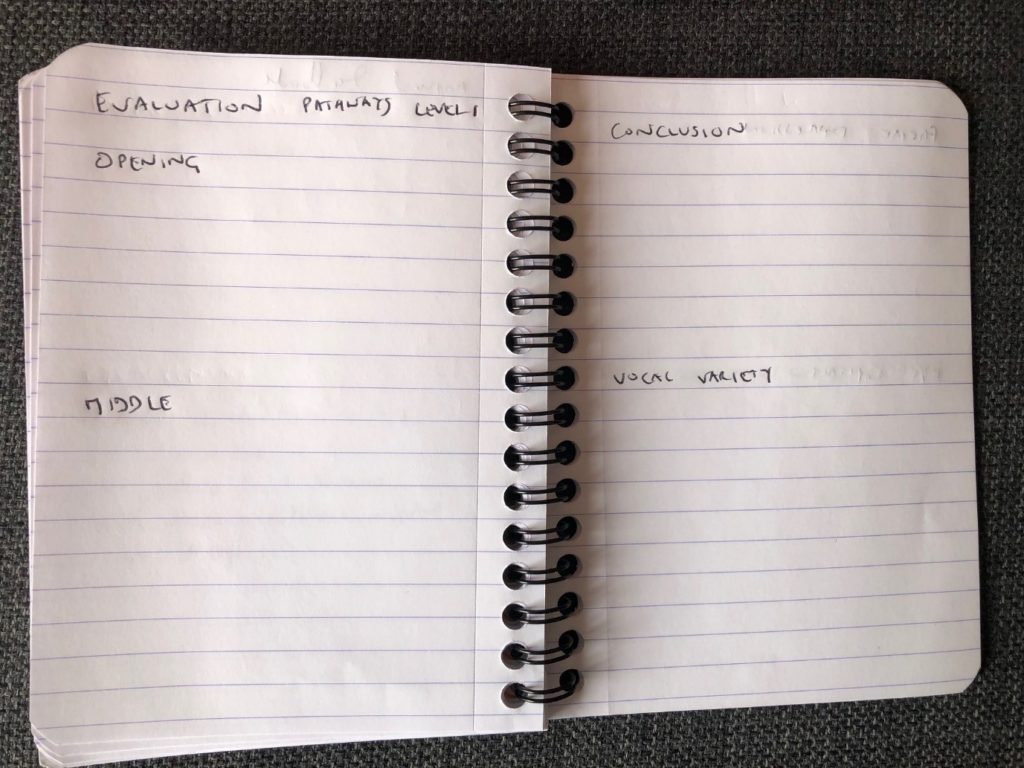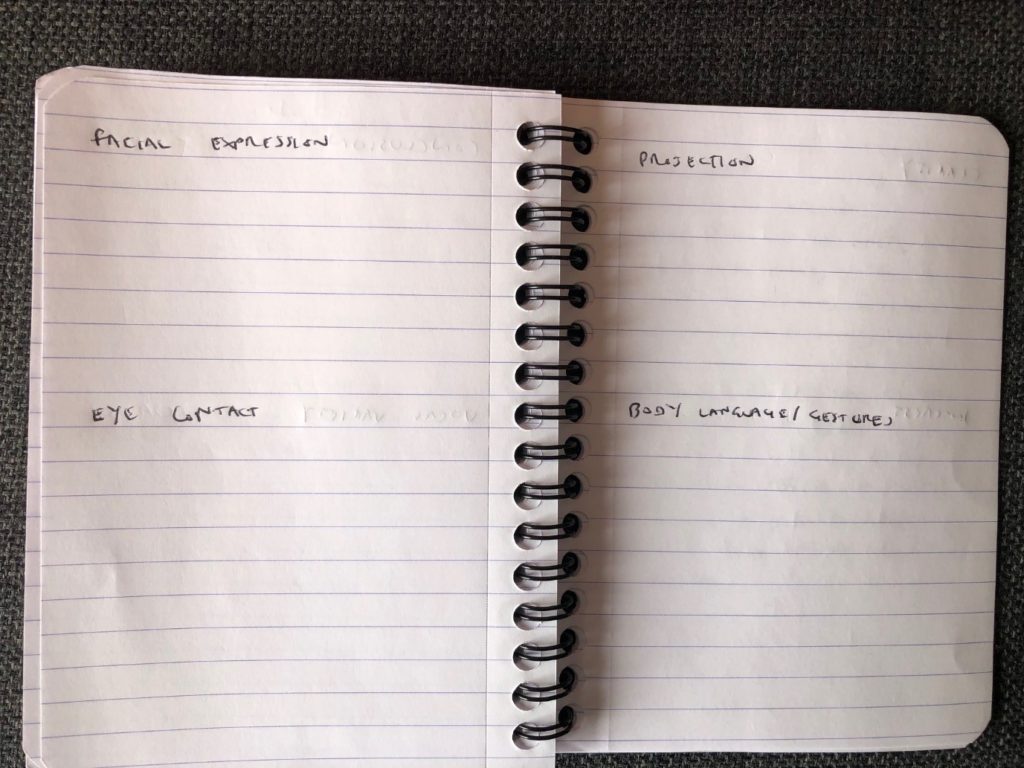Click to download the Word DOCX version
Introduction
What makes a great evaluation? Well before you know what makes a great evaluation, you have to know what makes a great speech. Only then are you able to analyse a speech in a meaningful way. I’m going to look at, the objective of an evaluation, why preparation beforehand is so crucial and what you need to do the night before you give the evaluation. I’m also going to look at the components of a great speech from an evaluator’s perspective, why you should make your evaluation personal and delve a little bit into the kind of recommendations you can make as an evaluator.
First off let’s look at the objective of an evaluation.
An evaluator’s objective
The objective of any evaluation is to add value to the speaker, to help them on their learning journey.
An evaluation is not about being negative or overly critical of a speech. Bear in mind that if you make too many recommendations to a speaker publicly, it may come across as being negative. It is best to share additional recommendations in a private setting with the speaker one on one. With Zoom, you could exchange phone numbers on private chat and have a phone conversation independently of the meeting, if you both felt comfortable doing so. Alternatively, you could share some additional feedback with the speaker by email in the days after the meeting.
It is as much about encouragement as it is about constructive criticism. You should see yourself as a kind of coach, not just as an evaluator. Your role is to help motivate the speaker to develop their public speaking skills further.
So, we’ve looked at the objective of an evaluation, now let’s look at the kind of preparation you need to do before you give an evaluation.
Preparation is key
When I sign up to do an evaluation, I prepare beforehand.
I find out what type of speech the speaker is going to deliver and I print off the evaluation form in advance. In this way I can familiarise myself with the objectives of the speech and what to look out for in the speech. If possible before the speaker delivers the speech, I try to ask the speaker if there is anything that they would like me to look out for in their speech that evening. On Zoom I do this by sending a private message in the Chat box.
The night before the meeting however, I start by preparing the notebook where I am going to take my notes on the speech. I take detailed notes in my notebook during the evaluation. I generally note down the objectives of the speech from the evaluation form in my notebook and incorporate my comments on those as part of my overall evaluation.
Trusty Notebook
I start by writing down a few headings and leaving a few lines underneath each heading for me to write my comments in during the speech.
These headings typically are: Opening, Middle, Conclusion, Eye contact, Gestures/Body language, Facial Expression, Vocal Variety, Projection, Descriptive language.
I typically start writing notes under the Opening heading first and then start filling in each of the others as they apply as the speech progresses. This may mean jumping from section to section while I am writing my notes but at the end when I am delivering my evaluation everything will be in sequence. I just need to remember to end with the heading on the Conclusion of the speech and that will wrap everything up nicely.
Sample notebook pages:


So, what are the components of a good speech?
Components of a good speech
It helps if you are familiar with what the components of a good speech are and then look for these qualities in the speech you are evaluating. If you already know what the components of a good speech are, then you can have some lines prepared beforehand that you can apply to the speech you are evaluating as a comment if it’s appropriate.
For example:
Opening – was there a dramatic opening/question/quote/did the speaker use props?
Middle – were the effective transitions from one section to the next/ was there a logical progression of ideas
Conclusion – was there a dramatic conclusion/ a ‘twist’ at the end?
Eye contact – did the speaker maintain eye contact with the audience throughout/ camera on Zoom
Were they looking at the ceiling or elsewhere in the room and not directly at the audience?
If in the Harcourt hotel, do they distribute their eye contact evenly around the room, not just focusing on one person (you might cause embarrassment if you do this).
Gestures – did the speaker use appropriate hand gestures?
Gestures can be hard to get right on Zoom. Suggest to the speaker that they practice on a free Zoom account with family member/friend to gauge what angle their screen should be positioned at for maximum impact.
Facial expression – did the speaker use animated expressions to convey the meaning of what they were saying?
Were they dead pan throughout even when they were saying something of great dramatic impact?
Facial expression can liven up a speech no end if done appropriately.
Vocal variety – did the speaker vary their pitch/tone/pace to reflect the subject matter
For example, did they speak more quickly to reflect an exciting subject or more softly to reflect a subject where they wanted to convey compassion or empathy with someone.
Projection – could we hear the speaker?
There are various exercises speakers can do to improve their projection. TM International has a free resource online of vocal exercises that you can use to improve your projection.
Descriptive language – did the speaker use descriptive language to paint visual pictures of what s/he was saying with his/her words?
Other headings you could include in your notebook as the components of a good speech include some of the objectives from the evaluation form e.g.:
Clarity – was the speaker’s language and diction clear?
Audience interest – did the speaker win the audience over with engaging content?
So, we’ve looked at the preparation beforehand and the components of a good speech, now we’re going to look at why you should make an evaluation ‘personal.’
Make it personal
When it comes to getting to the heart of the evaluation, I always try to reach out to the speaker on a personal level and tell him/her what it was about the speech that moved me personally and try to relate it to my own personal experience. I identify with the speaker and put myself in their shoes, so that we establish a bond.
For example, if a speaker gives a speech about his/her childhood, I say that their speech moved me because it made me think of my own childhood and a similar situation I encountered when I was a child. This shows that you identify with the speaker and adds a ‘human touch’ to your evaluation.
Sandwich Method
The evaluation technique I use is the ‘sandwich method.’ Many managers use this method of giving feedback to their employees when delivering performance reviews. Give some praise, give some constructive criticism and then give some praise again to reinforce the encouragement to conclude. Again, you should always try to leave the speaker feeling positive about their experience and feeling encouraged and motivated to pursue their next speech. The feeling of success is a powerful motivator and as evaluators we should be aiming to reinforce that message as much as possible when giving feedback.
So, we’ve looked at the objective of an evaluation, preparation, the components of a good speech, why you should make it personal and finally I’m going to delve into how to give a good recommendation.
Potential Recommendations
You can think of some potential recommendations that you might make to a speaker in advance, depending on how the speech goes and if they are appropriate on the night. For example:
- Try using props
- Try inviting audience interaction
- Try using more body language and standing instead of sitting when delivering on Zoom.
- Try practicing your speech with a friend or family member on a free account on Zoom
- Try recording yourself delivering your speech on Zoom and playing the recording back.
Alternatively, research some of the resources in the TM International Magazine online that you could point the speaker to for further guidance. For example, in the May 2020 edition of TM International magazine there is an article of perfecting your storytelling ‘Anatomy of a story,’ and an article on body language ‘What a nice gesture.’ If you read the magazine before you are due to give an evaluation you will be able to point the speaker to some of these articles if appropriate to help them to further hone their public speaking skills.
I would always recommend to any evaluator to practice giving an evaluation by watching a Ted Talks speaker deliver their speech and practice filling out an evaluation form and delivering an evaluation on the basis of what you have seen.
Two Ted Talks which would be suitable for this are:
This exercise will help you to bring your evaluation skills to the next level and further hone and refine your technique.
Best of luck with your next evaluation, remember the secret to a successful evaluation is in the preparation and a lot of the evaluation can be prepped beforehand!
Business photo created by pressfoto – www.freepik.com

